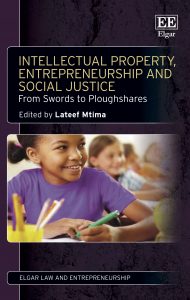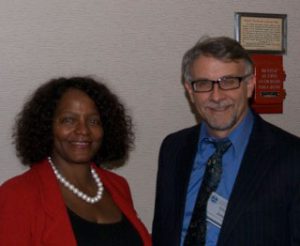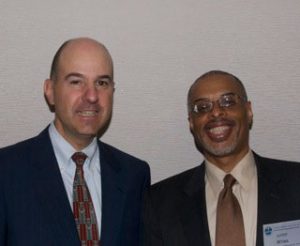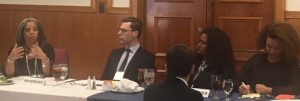Student Summary: Music
Summary from a Student: Music Sampling, Fair Use, and Social Justice
- Anthony Williams, rising 2L, Howard University School of Law
This session was a panel discussion with Lita Rosario (President & CEO - WYZ Girl Entertainment Consulting, LLC), Chanelle Hardy (Strategy Partnerships and Outreach – Google), and Dylan Gilbert (Policy Fellow - Public Knowledge); moderated by Kimberly Tignor (Public Policy Director - Lawyers’ Committee for Civil Rights Under Law). Panelists discussed the complicated relationship between music sampling, the Fair Use standard, and how to utilize the Fair Use standard as a tool for Social Justice. Attorney Hardy spoke to the imbalance that people of color face when dealing with copyright law enforcement. Specifically, suits for copyright infringement are brought against people of color at higher rates than their Caucasian counterparts. Additionally, people of color have lower success rates in asserted claims of copyright infringement.
Attorney Gilbert transitioned to how there needs to be legislation outlining a specific Fair Use standard. The Fair Use standard allows an individual to use copyrighted materials as long as it is not a substantial amount and for a transformative purpose. However, courts vary in deciding what qualifies as fair use. There is no law in the United States that expressly dictates how many seconds of a copyrighted sound recording an artist can use. Hip-Hop artists are particularly susceptible to the lack of consistent Fair Use guidelines, as Hip-Hop music relies heavily on music sampling. In response, Attorney Rosario emphasized this point by discussing a technique used a lot in Hip-Hop called looping, in which a composer takes a part of an instrumental and loops it multiple times to create a new sound. Although this technique essentially creates a new composition, nevertheless suits against Hip-Hop artists are initiated at disproportionate rates due to the inconsistency. For example in Bridgeport Music v. Dimension Films, rap group N.W.A was told that a music license was mandatory to use a sample, but in the Salsoul v. Madonna, Pop singer Madonna was allowed to use copyrighted material deemed de minimis or so trivial that it was not a violation of copyright infringement.
In the final segment, Attorney Rosario offered an interesting perspective on advocating for stronger copyright laws and a definitive fair use standard. Attorney Rosario represents some older musicians, whose primary source of income is through music sampling. Without stronger copyright protections these artists are unable to generate income as they are unable to tour or put out new music. Social justice advocacy takes many different forms and it was highly informative to learn about opportunities to advocate in the intellectual property realm.
Student Summary: Counterfeiting
Summary from a Student: Counterfeiting: Ways to Combat
- Iesha Summerall, rising 3L, Howard University School of Law
This session was presented by Toni Y. Hickey, the Deputy General Counsel & Chief IP Counsel at Cummins, Inc., a Fortune 500 company and Robert “Bob” J. Kenney, Partner at the one of the nation’s highest ranked IP firms—Birch, Stewart, Kolasch & Birch, LLP.
The presenters began the session by discussing what a counterfeit is and why it occurs. Bob explained that those who engage in counterfeiting make fake replicas of a real product. These replicas are produced with the intent of taking advantage of the superior value of the imitated product.
Counterfeiting can take place in each area of IP—tampering with patented products, passing off trademarks, and pirating copyrights. Toni and Bob also explained that sometimes the counterfeit product is not counterfeit because it is fake, but counterfeit because it is imported from another country without the permission of the intellectual property owner. These products are known as gray market goods.
After discussing what a counterfeit is and why it occurs, Bob and Toni discussed the social justice and business issues that occur as a result of counterfeiting. As a societal concern, defective or inferior goods can seriously injure and even kill consumers, advertently or inadvertently. Toni gave an example of counterfeiting that could affect health. When tampering with a pharmaceutical patent, a counterfeiter can remove the active ingredient from a drug, causing the drug to be completely ineffective. Bob also described how a tech defect in a counterfeit cell phone battery has caused serious injury in the past because it blew up while the consumer was using their cell phone. Another serious societal issue is that counterfeit products are used to support and fund terrorism, organized crime, and sex and drug trafficking.
Business issues that arise as a result of counterfeiting include the counterfeit goods harming the reputation of the trademark or the brand of a product. Counterfeit goods also cannibalize sales from the imitated goods and cause manufacturers to spend millions in resources on anti-counterfeiting efforts and regulation.
Combatting counterfeits can require different approaches and strategy, depending on a firm’s makeup. Toni offered her perspective of combating counterfeiting as in-house counsel and Bob offered his perspective as a partner in a mid-sized firm. One way firms can combat counterfeit goods is to record important marks with the Customs organizations globally. As in-house counsel, Toni further noted that in-house can make efforts to know how their products get to market and record with the appropriate Customs organization. This would make the counterfeit products easier to track before they enter the market. Generally, in order to combat counterfeits, any firm or company should always know the main problem areas and where most of the counterfeit products come from. Additionally, consumers can combat counterfeiting by refusing to purchase inauthentic goods. All in all, it was very interesting to learn the different effects of counterfeiting and how to combat them in the legal profession.
Recently Released Book
Professor Lateef Mtima, along with several other authors, recently released a book that is now available for purchase. Click here for more information!

In the Information Age, historically marginalized groups and developing nations continue to strive for socio-economic empowerment within the global community. Their ultimate success largely depends upon their ability to develop, protect and exploit their greatest natural resource: intellectual property. Through an exploration of the techniques used in social entrepreneurship, Intellectual Property, Entrepreneurship and Social Justice provides a framework by which historically marginalized communities and developing nations can cooperate with the developed world to establish a socially cohesive global intellectual property order. Divided into four parts, knowledgeable contributors discuss topics surrounding entrepreneurship and empowerment, education and advocacy, engagement and activism and, finally, commencement toward “IP Empowerment”. Experts in the field, scholars, law professors and students of intellectual property, human rights and international trade and development will find this book to be both resourceful and thought-provoking.
Past internship Placements
Awards earned by students in 2005
Tameka Simmons '05
Ms. Simmons won the 2005 Jan Jancin Award for demonstrating excellence in intellectual property law. Ms. Simmons stands out through her remarkable service, while still a law student, in furthering IP pedagogy at the law school and in CLEs, through her dedication and service to IIPSJ and related HUSL programs, and to the IP Bar. The Jan Jancin Award is a national IP award open to all law schools (a number of whom have large IP and technology transfer programs) and to all of their students. This award is sponsored by the American Intellectual Property Law Association (AIPLA), the American Intellectual Property Law Education Foundation (AIPLEF), and the Intellectual Propert Section of the American Bar Association.
Letoria House '06
At the 2005 annual Giles S. Rich Inn of Court Dinner (at which Sen. Patrick Leahy was the keynote speaker), Letoria House received the Giles S. Rich American Inn of Court Scholarship. This award is bestowed upon a recently admitted lawyer or a law student who has contributed significantly to the Inn as measured by "the degree and quality of participation" and by the person's "contribution to fulfilling the Inn's Mission." Part of the Inn's mission to further the principles of civility, professionalism, and competence in the practice of law. The GSR Scholarship is open to junior Inn members practicing throughout the DC/Maryland/Virginia region and to the student members of the GSR Inn from the five participating law schools (HUSL, Georgetown, Catholic, American, and George Mason).
Stephanie Harris '07
On the eve of her matriculation to HUSL, Ms. Harris became HUSL's first recipient of a Sidney B. Williams, Jr. Intellectual Property Law Scholarship sponsored by the American Intellectual Property Law Education Foundation. This scholarship is open to minority students throughout the nation. It is awarded to minority students with demonstrated accomplishment and potential in the field of IP practice. Ms. Harris's scholarship was renewed in 2005 on the basis of her continuing accomplishments as a HUSL student.
On a related note, Sid Williams, for whom the scholarship is named, is a great friend of HUSL, having served as IIPSJ's inaugural keynote honoree when IIPSJ was launched in 2002.
IP Empowerment Program
General Information
IIPSJ has an ongoing IP Empowerment Program working to empower marginalized communities economically, socially, and politically through their development, use, and lawful exploitation of IP. One of the steps in this ongoing program was the IP Empowerment Summit held on November 5, 2010. (In addition to the information below, the Summit Circular can be downloaded in pdf form.) Ongoing work is being done by committees and interest groups working on particular projects identified at the Summit and through partnering with the USPTO, NAACP, and other organizations.


IIPSJ IP Empowerment Summit
On November 5, 2010, the Institute for Intellectual Property and Social Justice (IIPSJ) conducted its first National IP Empowerment Summit at the Howard University School of Law. The IP Empowerment Summit brought together a diverse group of IP professionals, including IP lawyers from private practice, in-house counsel, and academia, to collaborate with legislators and public interest and community activists to devise strategies for community development built around artistic works and technological innovation.
IIPSJ IP Summit Empowerment Committees will be formed to create both discrete plans on particular topics and to collectively construct a blueprint to help educate and empower socio-economically marginalized communities to protect and commercially exploit their own IP works for their own benefit. We expect these efforts to lead to the establishment of IP Empowerment Zones in strategic urban locations. The groups to be served include associations of artists; students in fine arts, engineering, and science degree programs; community development association; and inventors. IIPSJ IP Summit attorneys will also work to empower attorneys serving these communities to develop the competencies and skills to carry out this work.
IP practitioners from a variety of law firms, in-house counsel departments, academic institutions, and public interest organizations have committed to participate in the IP Empowerment Summit, and plans are underway to link this program to similar initiatives around the nation.
The Need for IP-Focused Empowerment Strategies
In today's information-based economy, economic power is often dependent upon intellectual property. Consequently, IP attorneys can and should take the lead in empowering minority and other marginalized communities to compete for and attain a stake in the 21st century economy. Stimulating an increase in ethnic diversity within the intellectual property bar is a major objective of the Summit, and is a key means to implement the empowerment strategies.
IIPSJ IP Empowerment Summit Core Principles and Objectives
The core principles underlying IIPSJ's community IP empowerment program are:
- Education about IP rights and their value is central to the tasks at hand;
- Helping protect IP rights is a necessary step toward beneficial exploitation of the IP rights;
- Entrepreneurial values and skills are necessary for success of the program; and
- Political activism and legislative lobbying will play a valuable part in any such undertaking.
The one-day IP Empowerment Summit will bring together patent, trademark and copyright attorneys, other IP professionals, and members of the public interest and community action sectors, to meet, discuss, learn, and network about how they can implement the underlying principles through:
- Diversifying the field of IP practice;
- Empowering minority and marginalized communities through the vehicle of IP protection and exploitation; and
- Sharing best practices in an effort to further their professional careers and ascend to strategic positions through which to effectuate social change.
IP Empowerment Summit Pilot Community Programs
The IP Empowerment Summit will function as a clearinghouse of valuable information concerning minority artists, inventors, entrepreneurs, and IP professionals. Information regarding market opportunities and business development trends will also be developed as will a national database of minority IP lawyers. Much of this information will be captured at the Summit and then disseminated through IIPSJ’s website (www.iipjs.org). Summit participants will be invited to join permanent IP Empowerment Action Committees to assess and use the data, and to deploy the IP empowerment agenda through various community programs which include:
Minority Students in Science and Engineering Road Show
This program will engage law students, attorneys, and academicians in the development and presentation of "IP Road Show" programs designed to expose undergraduate minority science, engineering, and fine arts students to the fundamentals of IP law. The twin objectives of this program are to apprise students of information needed to exploit successfully their creative works as well as to expose them to the option of pursuing legal careers in the IP field.
Community IP Rights and Education Program
This program will educate high school and college students as well as community creative artists and inventors about the interconnected themes of the nature of intellectual property rights and of the value of exploiting creator's and inventor's rights. Law students and practicing IP attorneys will undertake to familiarize members of the target communities with the benefits of IP protection, and to help them to more fully appreciate that they are both creative artists and inventors as well as IP end-users. Community artists and inventors will learn how weak creator/inventor rights diminish their own prospects for IP-related economic empowerment. The program will include exploration of public domain material as a preferred source for user-generated content and private innovation since such material has fewer legal restrictions and concomitantly greater prospects for entrepreneurial success.
IP Talent Development Program
This program will bring together IP professionals and entrepreneurs to assist marginalized creative artists and inventors in the propitious exploitation of their creative output in the digital age. Sponsored community workshops and laboratories will provide development facilities, IP-related educational and vocational information, and opportunities for artistic license arrangements and technology transfer agreements.
IP Empowerment and Political Activism Project
This multi-faceted project will seek to increase public awareness and understanding of IP, will engage in political activism through community building around IP issues, and will function as a legislative developments think tank. IP professionals, educators, and public interest and community activists will collaborate on policy initiatives and lobbying efforts intended to impact IP legislation and government initiatives to ensure a close fit between IP rights and empowerment of minorities and other marginalized groups.
IIPSJ Program Date: November 5, 2010
The schedule for the IP Empowerment Program may be downloaded in PDF form.
Sponsors and Supporters
IIPSJ Education and Outreach
From its inception in 2002, IIPSJ has conducted programs to reach out to the bench and bar and to government officials through workshops and seminars as well as through participation in professional organizations such as the Giles Rich Inn of Court and the American Intellectual Property Association. One of IIPSJ's earliest conferences was a continuing legal education program designed for lawyers and judges. The CLE has been done annually ever since.
Over the years IIPSJ has sponsored or participated in various outreach initiatives and programs to educate undergraduates and community members about IP and its opportunities. This aspect continues to grow through partnering with the NAACP, the USPTO, Sramani, and with other organizations for particular programs.
IIPSJ at Howard University School of Law (HUSL) is designed to provide interested students with the tools needed to succeed as IP attorneys and advocates. IIPSJ at HUSL supports the IP curriculum, mentors students academically and professionally, supports student IP and entertainment law organizations, and sponsors outside speakers for various informational student programs.
Judicial Clerkship
The 2011 program will be held on Saturday, Oct. 20, 2011, at Georgetown University Law Center.
The JCIC is an annual program sponsored in part by the Institute for Intellectual Property & Social Justice that brings judges and judicial clerks from around the Washington, D.C., Virginia, and Maryland area to a Washington area law school to meet with law students to provide information about judicial internships and clerkships.
Flyer pdf
When: Oct. 20, 2011
Where: Georgetown University Law Center
What:
- Learn about judicial clerkships and internships from judges and law clerks
- Meet judges from federal and state trial, administrative, and appellate courts
- Hear Judges and law clerks describe the work of their courts and their own experiences
- Understand the application process and the selection criteria for clerkships and internships
Complimentary breakfast and lunch provided.
Registration
register at https://bitly.com/jcic2011rsvp
Sponsoring Organizations
- American University Washington College of Law
- Asian Pacific American Bar Association of the Greater Washington, D.C. Area
- Asian Pacific American Bar Association of Maryland
- Asian Pacific American Bar Association of Virginia, Inc.
- APABA Educational Fund
- George Washington University Law School
- Georgetown University Law Center
- Hispanic Bar Association of the District of Columbia
- Howard University School of Law
- Institute for Intellectual Property and Social Justice, Inc.
- South Asian Bar Association of the District of Columbia
- Vietnamese American Bar Association of the Greater Washington, D.C. Area, Inc.
Internships
IIPSJ at HUSL Internship & Clerkship Programs
IIPSJ, Inc.'s Program at HUSL includes helping place students in internships and clerkships, especially in IP-related settings.
Information is available at
Student Honors
IIPSJ Student Honors
Awards earned by students in 2005
Tameka Simmons '05
Ms. Simmons won the 2005 Jan Jancin Award for demonstrating excellence in intellectual property law. Ms. Simmons stands out through her remarkable service, while still a law student, in furthering IP pedagogy at the law school and in CLEs, through her dedication and service to IIPSJ and related HUSL programs, and to the IP Bar. The Jan Jancin Award is a national IP award open to all law schools (a number of whom have large IP and technology transfer programs) and to all of their students. This award is sponsored by the American Intellectual Property Law Association (AIPLA), the American Intellectual Property Law Education Foundation (AIPLEF), and the Intellectual Property Section of the American Bar Association.
Letoria House '06
At the 2005 annual Giles S. Rich Inn of Court Dinner (at which Sen. Patrick Leahy was the keynote speaker), Letoria House received the Giles S. Rich American Inn of Court Scholarship. This award is bestowed upon a recently admitted lawyer or a law student who has contributed significantly to the Inn as measured by "the degree and quality of participation" and by the person's "contribution to fulfilling the Inn's Mission." Part of the Inn's mission to further the principles of civility, professionalism, and competence in the practice of law. The GSR Scholarship is open to junior Inn members practicing throughout the DC/Maryland/Virginia region and to the student members of the GSR Inn from the five participating law schools (HUSL, Georgetown, Catholic, American, and George Mason).
Stephanie Harris '07
On the eve of her matriculation to HUSL, Ms. Harris became HUSL's first recipient of a Sidney B. Williams, Jr. Intellectual Property Law Scholarship sponsored by the American Intellectual Property Law Education Foundation. This scholarship is open to minority students throughout the nation. It is awarded to minority students with demonstrated accomplishment and potential in the field of IP practice. Ms. Harris's scholarship was renewed in 2005 on the basis of her continuing accomplishments as a HUSL student.
On a related note, Sid Williams, for whom the scholarship is named, is a great friend of HUSL, having served as IIPSJ's inaugural keynote honoree when IIPSJ was launched in 2002.

